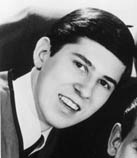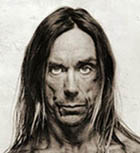In the posting before last, I mentioned some factoids connected to the month of April. Here’s some special April days I’d like to add to the list.
Today, Thursday, April 13 is the big birthday for Dick Peterson, vocalist & drummer for the Kingsmen. April 13 is also the birthday for Duane Eddy, Jack Casady (Jefferson Airplane / Hot Tuna), Al Green, Thomas Jefferson, Don Adams, Max Weinberg (E Street Band + Conan O’Brien Show), and Lyle Waggoner.

Dick Peterson joined the Kingsmen in late 1963 after Gary Abbott left the band. He’s been a member of the band ever since. As original Kingsmen leader Lynn Easton shifted his priorities to be the frontman and saxophone player, Dick became the drummer. As the band evolved over the years, changing personnel, Dick found himself taking on more of the leadership position, eventually becoming the lead vocalist for many Kingsmen songs, including the mega-hit LOUIE LOUIE.
If perseverance counted for anything, then Dick must be commended for keeping the spirit of the Kingsmen and LOUIE LOUIE alive all these years. His vocals provide an excellent emulation of the original vocals provided by Jack Ely in 1963.
In addition to leading the band for some 30+ years, Dick has a very colorful career in the entertainment industry, holding staff positions with Capitol Records, Chapel Music and Avco Embassy, as well as music producer for various television specials on ABC, PBS, NBC, and CBS. He’s written songs that have been recorded by Kenny Rogers, Laura Branigan, and Bill Medley, to name a few.
Where Dick truly deserves to be recognized as a “hero of LOUIE LOUIE” is in the matter of reclaiming artist ownership of original master recordings. Up until the Kingsmen forced a class action suit against Gusto/GML, the likelihood of any musician reclaiming their original masters seemed like a very distant fantasy. Dick spent a lot of time and money to fight this case, and was eventually rewarded for his hard work. With the help of a mysterious “Mr. X,” a significant chunk of money was given to Dick for the establishment of a “Louie Louie Foundation” to fight this legal battle, and help other musicians with similar problems.
On April 11, 1998, it was announced that the Supreme Court would not hear this case, and the ruling in the 9th U.S. Circuit Court of Appeals would remain intact. By this action, the Kingsmen were entitled to $200,000 in royalties, and all of the original 105 master recordings. The price of this victory was not cheap. The legal costs exceeded whatever “Mr. X” invested into this new foundation, and what I’ve been told, all money the band has made from record sales and licensing from their master recordings has not yet reached the break-even point.
Nonetheless, this is a major victory for the Kingsmen and all bands that have been screwed over by record labels. If there’s one man responsible for making this happen, it would be Dick Peterson. Happy Birthday, Dick Peterson!
If you’d like to celebrate his birthday in a way he’ll appreciate- buy his new book. Feel free to mention LouieLouie.net when you place this order…
April 21 is the birthday for two big heroes in the Louie Universe- Iggy Pop and Jeff “Stretch” Riedle. It’s also the birthday for King Louis IV of France (1713-1793), Queen Elizabeth of England, John Muir, Tony Danza, Andie MacDowell, Sister Helen Prejean, and Anthony Quinn.

Iggy Pop celebrates his 59th birthday this year. One of the most over-used clichés in rock journalism is the moniker of “godfather of punk” that’s been attached to James Osterberg, aka Iggy Pop. Nonetheless, it’s a catchy title that seems to stick, so I won’t bother to dispute it.
For someone that was too young to appreciate the impact of Iggy Pop and the Stooges when they came out with their first album in 1969, I had a hard time connecting it to a period dominated by psychedelic hippy music. What Iggy represented was a primal opposite of all the other music represented within the “rock music” genre. Along with MC5 and the Sonics, the Stooges deliberately and forcefully forged a ragged sub-genre of rock that was raw, powerful, and very different from other music that was happening during the same period. Just as the psychedelic era was defiant in it’s differences between the kooky showmanship of bands like Paul Revere & the Raiders, the primal approach of the Stooges and company provided a harsh contrast between the psychedelic-progressive rock noodlings of the times.
Metallic K.O. was a major turning point in the Legend of LOUIE LOUIE. This iconic album marked the final appearance of Iggy & the Stooges, recorded live at Michigan Palace in Detroit on February 9th, 1974. Using all the naughty lyrics that folks thought they were hearing with the original Kingsmen recording, Iggy delivered a obscenity-driven version of LOUIE LOUIE that reminded folks why this powerful three-chord ditty still mattered. Like Frank Zappa, Iggy Pop kept LOUIE LOUIE, or LOUIE-like songs as part of his regular repertoire, pulling it out for the pure hell of it, ignoring the idiots that believed the song was no longer “hip.”
Four years later, the motion picture “Animal House” came out, and LOUIE LOUIE was once again part of pop culture consciousness, thanks, or in spite of Mr. Pop and Mr. Zappa.
In 1993, Iggy unleashed American Caesar, which I believe was one of his greatest albums ever. On this album, a 16 track masterpiece that addressed the universal issues of loneliness, hatred, jealousy, paranoia and love, Iggy provided a very different variation of LOUIE LOUIE. Unlike the Metallic K.O. version and other live performances of LOUIE LOUIE, this new version was a more sophisticated interpretation of the song, void of F.C.C.-prohibited words, using it as a social commentary on politics, economics, the American health care system, and the work of Fyodor Dostoevsky.
Some folks thought this was too weird for Iggy, but I thought it was absolutely brilliant! Long may you run, Mr. Pop!

My friend Jeff “Stretch” Riedle is the man that I personally hold responsible for getting me involved with this LOUIE LOUIE stuff that has somehow transformed my life. Many years ago, during one late night shift at KFJC Radio, a college station in Los Altos Hills, California, Stretch had a kooky idea of playing an hour’s worth of LOUIE LOUIE recordings. This led to a friendly rivalry with neighbors-across-the-bay KALX of Berkeley doing their own nothing-but-LOUIE shows, culminating with a big event at KFJC that would be known as “Maximum: LOUIE LOUIE.” For 63 hours, LOUIE LOUIE was the only song played on this station, with no version supposedly played twice.
Richard Berry, author of the song, who figured there were maybe 10 versions of this song at the most, was invited to this event as an honored guest. At the time, he was struggling and on welfare, while trying out a career change by learning how to do data entry at a vocational school in Los Angeles. With a train ticket and hotel accommodations arranged by the staff of KFJC, Richard and his daughter Christy traveled over 300 miles to this event, not expecting anything out of the ordinary.
It turned out there was a lot of media coverage of this event, including a cover story on the Wall Street Journal, lots of television news segments, and a wealth of publications. Jack Ely, original vocalist for the Kingsmen, got wind of this event, and flew in from Portland, Oregon, marking the very first time Richard had ever met a member of the band that transformed his song into a mega hit heard around the world.
Richard was absolutely overwhelmed by all the attention he received, and his life was forever changed by this event. When Richard got home, his phone was ringing off the hook, and his career took off in ways it never had before. A few months later, he was invited to the Tacoma Dome in Washington state, where he performed in front of thousands of people, accompanied by Northwest musicians that had big success with LOUIE LOUIE- the Kingsmen, Paul Revere & the Raiders, The Wailers, Little Bill Engelhart, and Ron Holden. Within 2 years of the KFJC event, Richard Berry was able to reclaim partial ownership of his iconic composition, thanks to the work of Chuck Rubin of Artist Rights Enforcement.
Ultimately, I do believe that Stretch has a lot to do with Richard’s success. Without the late night LOUIE LOUIE radio show that led to the massive 63 hour marathon at KFJC, it’s hard to imagine that Richard would have received the big attention that he did. I certainly wouldn’t have started work on my epic documentary on the song, and I certainly wouldn’t have created a LouieLouie.net website. How can anyone know what would have happened if a certain chain of events did not occur?
Stretch has been involved with a lot of different things in the local music community of the San Jose region. He’s played drums with a lot of different bands, including the Shockwaves, the Sub-Mersians, and Skunk Mojo [now known as Cassadys Hammer], to name but a few. For many years, he managed Streetlight Records of San Jose, one of the most successful independent record stores in the region.
From 1997-2002, Stretch was the co-owner of CD LAND, of Palo Alto, one of the greatest places in the area for cheap CDs, rare imports, and free live performances. Over the years, there were some really amazing free performances at this little store, featuring such musicians as the Chocolate Watchband, Syndicate of Sound, Gordon Waller (of Peter & Gordon), Cyril Jordan (of Flamin’ Groovies), John Doe (of X), Mary Lou Ford, Agent Orange, Davie Allan & The Arrows, and the Police (not to be confused with Sting and company), who showed up when a certain go-go dancer was acting a tad too silly for community standards.
By some odd coincidence, the very first Apple Computer retail store came into existence on the same block as CD LAND, less then 1000 feet away. According to one of Stretch’s employees, Apple CEO Steve Jobs did actually visit the store, and claimed “it smelled funny.” Not long afterwards, Apple Computer began to sell music via their very popular iTunes service.
Currently, Stretch is working for someone else at yet another job in the music retail industry. From Wednesday to Sunday, he can be found working behind the drum counter at Starving Musician, a store run by musicians for musicians in Santa Cruz, California. If you’d like to make him happy, go in there to give him yet another version of LOUIE LOUIE, buy an expensive drum kit, or just bring him some pizza, preferably with anchovies or olives. He’s also not against receiving donations to maintain the world’s largest collection of LOUIE LOUIE recordings, for which he is the primary administrator.
My wife’s birthday is April 12. She’s married to a guy who collects Louie Louie versions. Does that count?
Yes, Andy! It does indeed count in the crazy synchronicity of the LOUIE LOUIE universe! Did she ever get accepted by MAXIM magazine? Perhaps the next posting could include a picture of her with the title “What kind of Woman Would Marry a Guy Who Collects Too Many LOUIE LOUIEs?”
LOUIE LOUIE is a family song for me. I grew up with that song and 3 of Richard’s daughters. Thank you and hello to everyone who loves LOUIE LOUIE!!!!